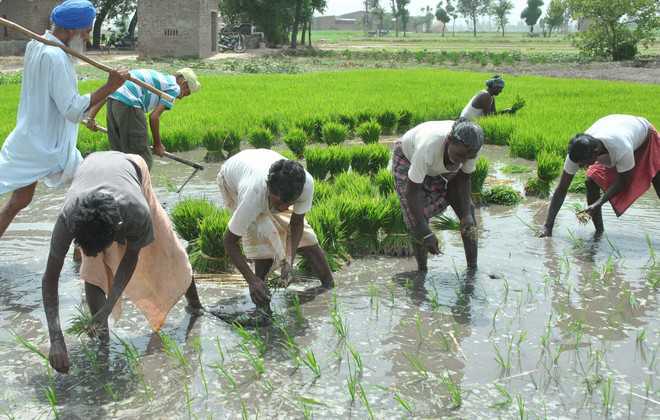
The move to shift the date from the earlier practice of June 15 to June 20 was initiated by a proposal from the Punjab Pollution Control Board
Kuljit Bains
Following a laudable initiative of banning transplantation of paddy before June 20, the state government is in the midst of a great battle with farmers, majority of who in their wisdom are completely at odds with the directive. With some villages in dark zones, such as in Moga district, drilling into the earth over 600 feet, the precarious groundwater situation does not need underscoring. It makes the paddy period restriction a must. But when practically no farmer is in agreement, there is an administrative mess on hand.
Right now, protests are being held across the state; agriculture officers implementing the ban are being detained by farm activists; FIRs are being registered against farmers; paddy transplanted before date is being destroyed in fields; power supply has been restricted (affecting other crops too); and the government has threatened not to procure early-sown paddy when the harvest comes. This is a perfect recipe for a law and order situation; if not, then a loss of face for the government in succumbing to the pressure.
Farmers are a conservative community, and may also lack knowledge of the agriculture science and its advancements. But that does not necessarily mean their protest is unjustified. In the present case, they claim the varieties most of them have been sowing in recent years will not be ripe for harvest in time for the next crop. That will also cause procurement issues owing to high moisture content in the produce.
The government’s claim is there are varieties recommended by Punjab Agricultural University that mature in a shorter duration, and are appropriate for transplanting on June 20. This is correct, but the complete truth is that the need for this variety has been suddenly sprung upon the farmers as well as the Agriculture Department, with neither prepared for it.
The move to shift the date from the earlier practice of June 15 to June 20 was initiated by a proposal from the Punjab Pollution Control Board, which had suggested June 25. It was a good idea, but perhaps this year could have been used to make the farmers aware, and also gear up the government’s own machinery to ensure adequate supply of appropriate seeds. None of that happened, but the government did take up the implementation of the prohibitory order with great zeal; therefore the agitation across the state.
The Opposition has been adding to the confusion by claiming the date has been shifted as the government was unable to provide sufficient power. That is not true, as the sequence of events leading to the decision shows. On a critical subject such as groundwater, the Opposition is doing a disservice by sowing distrust among farmers regarding a scientific issue.
As it is, there are reasons behind farmers’ distrust of recommendations of PAU, the strongest being the earlier fiasco of a variety that was made popular but not procured by the FCI because of colour issues. The Agriculture Department too has not covered itself in glory with a series of scams, especially in pesticides. Winning trust is a major issue here. And that does not happen with instant orders. Moreover, even the claim that the short-duration variety gives the same yield as the long-duration is also being challenged by farmers.
Dr Jasbir Singh Bains, Punjab Director of Agriculture, has warned of parts of the state going barren from over-exploitation of water. It is a serious issue that requires communication and trust between the scientific community, the government, and the farmers. As things stand today, how far we are from diversification from paddy is made obvious by the miserable failure to change even the variety of paddy. That is because the entire agriculture economy is part of a larger framework, in which the farmer has the least control.
If the present impasse has to be resolved, the government as well as farm leaders have to shed their confrontationist approach, and present their respective cases point by point, and make a genuine attempt at addressing the concerns. The water reserves found at the depths to which the state is plumbing are a one-time non-renewable resource.



























